-
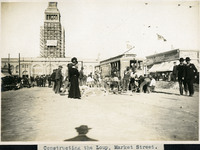 McCarthy Album 06, Photograph 195
McCarthy Album 06, Photograph 195 Caption: "Constructing the Loup, Market Street," 1906. A view of construction workers repairing the tracks on Market Street, with the scaffolded Ferry Building in the distance, and numerous pedestrians observing the effort.
-
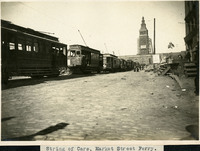 McCarthy Album 06, Photograph 194
McCarthy Album 06, Photograph 194 Caption: "String of Cars, Market Street Ferry," 1906. A view of cable cars, people, and a scaffolded Ferry Building at the end of Market Street, after the 1906 earthquake.
-
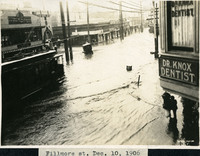 McCarthy Album 06, Photograph 193
McCarthy Album 06, Photograph 193 Caption: "Fillmore St. Dec. 10, 1906," A view of a flooded Fillmore Street in San Francisco during the winter of 1906.
-
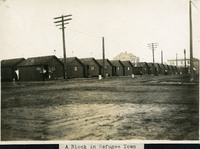 McCarthy Album 06, Photograph 192
McCarthy Album 06, Photograph 192 Caption: "A Block in Refugee Town," 1906. A row of structures built for the refugees of San Francisco who lost their homes after the earthquake and fires.
-
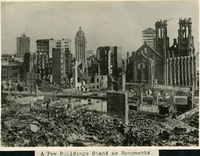 McCarthy Album 06, Photograph 191
McCarthy Album 06, Photograph 191 Caption: "A Few Buildings Stand as Monuments." A view of San Francisco buildings in ruins after the 1906 earthquake and fires.
-
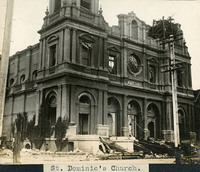 McCarthy Album 06, Photograph 190
McCarthy Album 06, Photograph 190 Caption: "St. Dominic's Church," shows a view of the damage to the church after the 1906 earthquake.
-
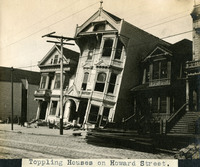 McCarthy Album 06, Photograph 189
McCarthy Album 06, Photograph 189 Caption: "Toppling House on Howard Street," 1906. shows two Queen Anne-style houses that have toppled off their foundations after the earthquake.
-
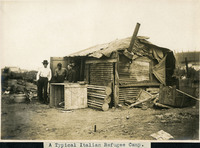 McCarthy Album 06, Photograph 188
McCarthy Album 06, Photograph 188 Caption: "A Typical Italian Refugee Camp," c. 1906. Makeshift hut with four unidentified men standing in doorway. After the earthquake and fire that destroyed much of San Francisco in April 1906, hundreds of thousands of people were left homeless. Many of these people established temporary refugee camps, using debris from the destruction to cobble together shelters.
-
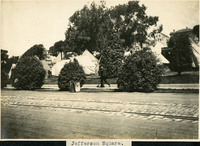 McCarthy Album 06, Photograph 187
McCarthy Album 06, Photograph 187 Caption: "Jefferson Square," c. 1906. A view of tents in Jefferson Square in San Francisco, likely for refugees who were left homeless after the earthquake and fires.
-
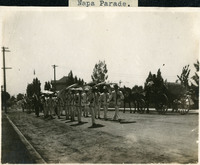 McCarthy Album 06, Photograph 186
McCarthy Album 06, Photograph 186 Caption: "Napa Parade," c. 1907. A view of a parade procession on a dirt road in Napa.
-
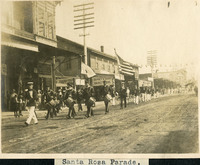 McCarthy Album 06, Photograph 185
McCarthy Album 06, Photograph 185 Caption: "Santa Rosa Parade," c. 1907. A view of drummers in band attire leading a parade down a dirt street in Santa Rosa.
-
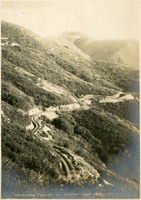 McCarthy Album 06, Photograph 184
McCarthy Album 06, Photograph 184 Caption: "Tamalpais Tavern and Railway From West Point," c. 1907.
-
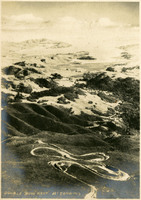 McCarthy Album 06, Photograph 183
McCarthy Album 06, Photograph 183 Caption: "Double Bow Knot Mt Tamalpais," c. 1907. A bird's eye view of the twisty road up Mount Tamalpais in Marin County.
-
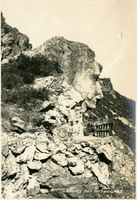 McCarthy Album 06, Photograph 182
McCarthy Album 06, Photograph 182 Caption: "Profile Rock Mt Tamalpais," c. 1907, shows a rock formation that resembles a human profile at Mount Tamalpais in Marin County.
-
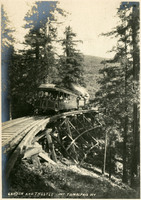 McCarthy Album 06, Photograph 181
McCarthy Album 06, Photograph 181 Caption: "Canyon and Trestle Mt Tamalpais RR.," c. 1907. Muir Woods Railway, established in 1896 as a scenic tourist railway between Mill Valley and the east peak of Mount Tamalpais in Marin County.
-
 McCarthy Album 06, Photograph 181.0
McCarthy Album 06, Photograph 181.0 Caption: "Tamalpais Views," is a label for photographs 179 - 184 in album 6, showing a variety of views of Mount Tamalpais in Marin County.
-
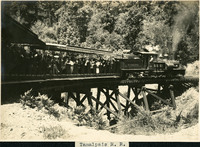 McCarthy Album 06, Photograph 180
McCarthy Album 06, Photograph 180 Caption: "Tamalpais R.R." c. 1907. A view of the Muir Woods Railway, established in 1896 as a scenic tourist railway between Mill Valley and the east peak of Mount Tamalpais in Marin County.
-
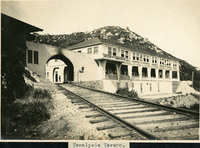 McCarthy Album 06, Photograph 179
McCarthy Album 06, Photograph 179 Caption: "Tamalpais Tavern," c. 1907. The Tamalpais Tavern opened in 1896 on top of Mount Tamalpais and quickly became a popular destination for Bay Area residents who rode the Muir Woods Railway up and down the mountain. A fire destroyed the tavern in 1923 and a smaller, more modest building was erected in 1924 but closed at the start of World War II.
-
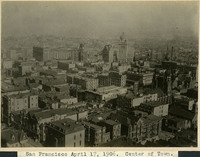 McCarthy Album 06, Photograph 178
McCarthy Album 06, Photograph 178 Caption: "San Francisco April 17, 1906. Center of Town." A bird's eye view of the city the day before the earthquake and fires.
-
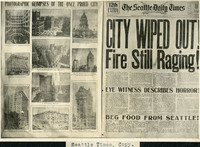 McCarthy Album 06, Photograph 177
McCarthy Album 06, Photograph 177 Caption: "Seattle Times, Copy." Photograph of The Seattle Daily Times front page and photographs of the San Francisco earthquake's aftermath with headline: "City Wiped Out! Fire Still Raging!" Dated April 20, 1906.
-
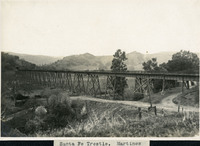 McCarthy Album 06, Photograph 176
McCarthy Album 06, Photograph 176 Caption: "Santa Fe Trestle. Martinez, "c. 1906.
-
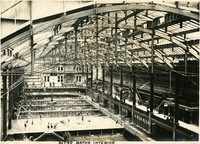 McCarthy Album 06, Photograph 175
McCarthy Album 06, Photograph 175 Caption: "Sutro Baths Interior," c. 1910. Interior shot of the Sutro Baths, north of the Cliff House. Designed by Adolph Sutro in 1894, the bathhouses at one time covered three oceanfront acres just north of Ocean Beach and the Cliff House. Eventually the Sutro Baths fell into disrepair and what was left of them burned down in 1966. Since 1973, the concrete ruins have been part of the Golden Gate National Recreation Area. See also 96-07-08-alb02-023, and 96-07-08-alb03-117.
-
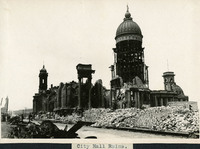 McCarthy Album 06, Photograph 174
McCarthy Album 06, Photograph 174 Caption: "City Hall Ruins." An expanded view of the destroyed City Hall after the 1906 earthquake and fire. Stacks and piles of bricks are lined up at the curb of the street, likely to be used for reconstruction.
-
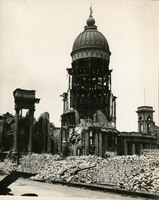 McCarthy Album 06, Photograph 173
McCarthy Album 06, Photograph 173 No Caption: Caption in photograph album (172.0): "City Hall Tower Before and after the Quake." 1906. A view of San Francisco City Hall after the April 18, 1906 earthquake shows the devastation to the structure.
-
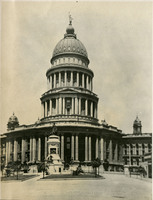 McCarthy Album 06, Photograph 172
McCarthy Album 06, Photograph 172 No caption. Caption in photograph album (172.0): "City Hall Tower Before and after the Quake." 1906. A view of San Francisco City Hall before the April 18, 1906 earthquake.
-
 McCarthy Album 06, Photograph 172.0
McCarthy Album 06, Photograph 172.0 Label in photograph album for photographs 172 and 173: "City Hall Tower Before and after the Quake."
-
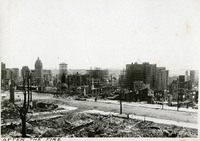 McCarthy Album 06, Photograph 171
McCarthy Album 06, Photograph 171 Caption: "After the Fire," shows the remains of San Francisco after the 1906 earthquake and fires. Considered one of the worst natural disasters in the country's history, the 1906 San Francisco earthquake and resulting fires killed an estimated 3,000 people and destroyed over 500 city blocks, leaving approximately 200,000 residents homeless.
-
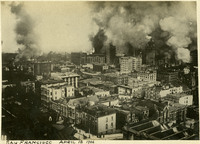 McCarthy Album 06, Photograph 170
McCarthy Album 06, Photograph 170 Caption: "San Francisco April 18 1906." A view of the city of San Francisco ablaze after the 1906 earthquake. Considered one of the worst natural disasters in the country's history, the 1906 San Francisco earthquake and resulting fires killed an estimated 3,000 people and destroyed over 500 city blocks, leaving approximately 200,000 residents homeless.
-
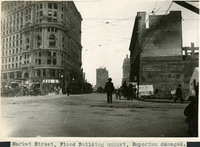 McCarthy Album 06, Photograph 169
McCarthy Album 06, Photograph 169 Caption: "Market Street, Flood Building Unhurt, Emporium Damaged." Considered one of the worst natural disasters in the country's history, the 1906 San Francisco earthquake and resulting fires killed an estimated 3,000 people and destroyed over 500 city blocks, leaving approximately 200,000 residents homeless.
-
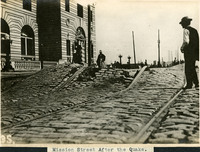 McCarthy Album 06, Photograph 168
McCarthy Album 06, Photograph 168 Caption: "Mission Street After the Quake," 1906. A view of the severe damage to Mission Street after the earthquake. Considered one of the worst natural disasters in the country's history, the 1906 San Francisco earthquake and resulting fires killed an estimated 3,000 people and destroyed over 500 city blocks, leaving approximately 200,000 residents homeless.
-
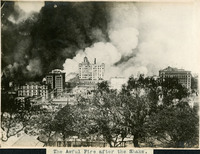 McCarthy Album 06, Photograph 167
McCarthy Album 06, Photograph 167 Caption: The Awful Fire After the Shake," 1906. A view of San Francisco ablaze after the 1906 earthquake. Considered one of the worst natural disasters in the country's history, the 1906 San Francisco earthquake and resulting fires killed an estimated 3,000 people and destroyed over 500 city blocks, leaving approximately 200,000 residents homeless.
-
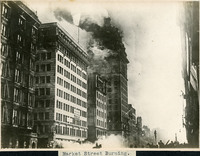 McCarthy Album 06, Photograph 166
McCarthy Album 06, Photograph 166 Caption: "Market Street Burning." A view of the Call Building on Market and 3rd Streets on fire after the 1906 earthquake, with people and horses in the foreground. Considered one of the worst natural disasters in the country's history, the 1906 San Francisco earthquake and resulting fires killed an estimated 3,000 people and destroyed over 500 city blocks, leaving approximately 200,000 residents homeless.
-
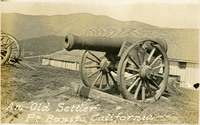 McCarthy Album 06, Photograph 165
McCarthy Album 06, Photograph 165 No Caption: Inscribed on the photograph: "An "Old Settler" Pt. Bonita, California." A view of a large cannon on a carriage.
-
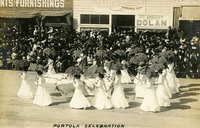 McCarthy Album 06, Photograph 164
McCarthy Album 06, Photograph 164 Caption: "Portola Celebration." 1909. The Portola Festival was a grand celebration devised to commemorate the discovery of San Francisco Bay by Gaspar De Portola, and for the public to celebrate the future of the rebuilt city after the 1906 earthquake and fires.
-
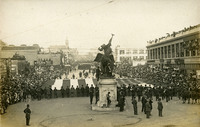 McCarthy Album 06, Photograph 163
McCarthy Album 06, Photograph 163 No Caption: A view of the large crowds surrounding an enormous United States flag and the Spanish-American War Memorial (Douglas Tildon, sculptor) at the Portola Festival of 1909. The Portola Festival was a grand celebration devised to commemorate the discovery of San Francisco Bay by Gaspar De Portola, and for the public to celebrate the future of the rebuilt city after the 1906 earthquake and fires.
-
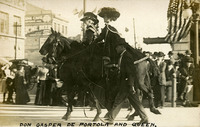 McCarthy Album 06, Photograph 162
McCarthy Album 06, Photograph 162 Caption: "Don Gasper [sic] de Portola and Queen," 1909. Participants at the Portola Festival on horseback and dressed in period costume as Don Gaspar De Portola and Queen. The Portola Festival was a grand celebration devised to commemorate the discovery of San Francisco Bay by Gaspar De Portola, and for the public to celebrate the future of the rebuilt city after the 1906 earthquake and fires.
-
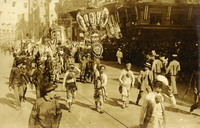 McCarthy Album 06, Photograph 161
McCarthy Album 06, Photograph 161 No Caption: A scene from the 1909 Portola Festival, a grand celebration devised to commemorate the discovery of San Francisco Bay by Gaspar De Portola, and for the public to celebrate the future of the rebuilt city after the 1906 earthquake and fires.
-
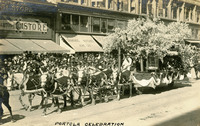 McCarthy Album 06, Photograph 160
McCarthy Album 06, Photograph 160 Caption: "Portola Celebration,"1909. The Portola Festival of 1909 was a grand celebration devised to commemorate the discovery of San Francisco Bay by Gaspar De Portola, and for the public to celebrate the future of the rebuilt city after the 1906 earthquake and fires.
-
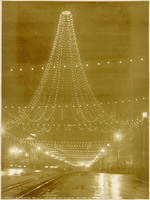 McCarthy Album 06, Photograph 159
McCarthy Album 06, Photograph 159 No Caption: The photograph has a hand-written inscription stating: "Portola Electric Bell Copyright 1909 Pillsbury Picture Co. No. 800." Installed on the intersection of Third and Market Streets in San Francisco, the Portola Electric Bell contained two thousand bulbs and rose 125 feet above the street. It was part of the Portola Festival of 1909, a grand celebration devised to commemorate the discovery of San Francisco Bay by Gaspar De Portola, and for the public to celebrate the future of the rebuilt city after the 1906 earthquake and fires.
-
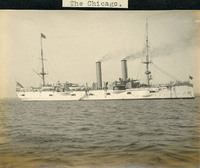 McCarthy Album 06, Photograph 158
McCarthy Album 06, Photograph 158 Caption: "The Chicago," a two stack steam ship plying the waters of an unidentified location.
-
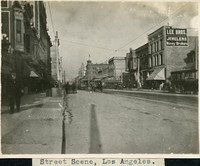 McCarthy Album 06, Photograph 157
McCarthy Album 06, Photograph 157 Caption: "Street Scene, Los Angeles," c. 1908. A view of an early twentieth street scene in Los Angeles, with horse-drawn vehicles, trolley cars, and numerous buildings.
-
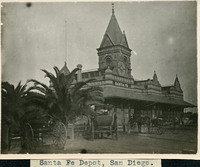 McCarthy Album 06, Photograph 156
McCarthy Album 06, Photograph 156 Caption: "Santa Fe Depot, San Diego," c. 1908. Built in 1887 for the California Southern Railroad Company, the small depot station was later demolished to make way for a much larger station, which opened in 1915.
-
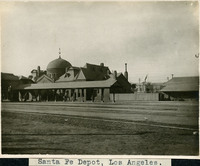 McCarthy Album 06, Photograph 155
McCarthy Album 06, Photograph 155 Caption: "Santa Fe Depot, Los Angeles," c. 1910. The La Grande Station opened in 1893 and served as the main passenger terminal for the Atchinson, Topeka and Santa Fe Railway (Santa Fe). The building, with its Moorish inspired architecture, was heavily damaged by the 1933 Long Beach earthquake and was eventually demolished in 1946.
-
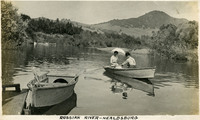 McCarthy Album 06, Photograph 154
McCarthy Album 06, Photograph 154 Caption: "Russian River - Healdsburg," c. 1914. William and Grace McCarthy are seen rowing a boat on the Russian River.
-
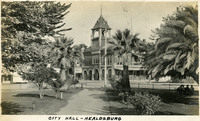 McCarthy Album 06, Photograph 153
McCarthy Album 06, Photograph 153 Caption: "City Hall - Healdsburg," c. 1910. The Healdsburg City Hall was built in 1886 and demolished in 1960.
-
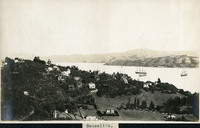 McCarthy Album 06, Photograph 152
McCarthy Album 06, Photograph 152 Caption: "Sausalito," c. 1908. A view of the town of Sausalito with ships in Richardson Bay.
-
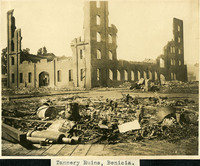 McCarthy Album 06, Photograph 151
McCarthy Album 06, Photograph 151 Caption: "Tannery Ruins, Benicia," c. 1905, shows the destroyed building of the Benicia Tannery.
-
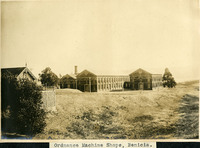 McCarthy Album 06, Photograph 150
McCarthy Album 06, Photograph 150 Caption: "Ordnance Machine Shops, Benicia," c. 1905. A view of the Benicia Arsenal's Machine Shops.
-
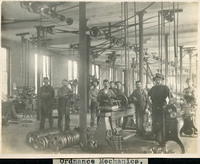 McCarthy Album 06, Photograph 149
McCarthy Album 06, Photograph 149 Caption: "Ordnance Mechanics," c. 1905. William McCarthy (center) stands before equipment with several unidentified mechanics at the Benicia Arsenal.
-
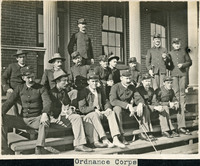 McCarthy Album 06, Photograph 148
McCarthy Album 06, Photograph 148 Caption: "Ordnance Corps," c. 1905. A group photograph of the Ordnance Corps at the Benicia Arsenal. The broad mission of the Ordnance Corps was to supply combat weapons and ammunition to U.S. Army forces on the west coast of the United States.
 McCarthy Album 06, Photograph 195 Caption: "Constructing the Loup, Market Street," 1906. A view of construction workers repairing the tracks on Market Street, with the scaffolded Ferry Building in the distance, and numerous pedestrians observing the effort.
McCarthy Album 06, Photograph 195 Caption: "Constructing the Loup, Market Street," 1906. A view of construction workers repairing the tracks on Market Street, with the scaffolded Ferry Building in the distance, and numerous pedestrians observing the effort. McCarthy Album 06, Photograph 194 Caption: "String of Cars, Market Street Ferry," 1906. A view of cable cars, people, and a scaffolded Ferry Building at the end of Market Street, after the 1906 earthquake.
McCarthy Album 06, Photograph 194 Caption: "String of Cars, Market Street Ferry," 1906. A view of cable cars, people, and a scaffolded Ferry Building at the end of Market Street, after the 1906 earthquake. McCarthy Album 06, Photograph 193 Caption: "Fillmore St. Dec. 10, 1906," A view of a flooded Fillmore Street in San Francisco during the winter of 1906.
McCarthy Album 06, Photograph 193 Caption: "Fillmore St. Dec. 10, 1906," A view of a flooded Fillmore Street in San Francisco during the winter of 1906. McCarthy Album 06, Photograph 192 Caption: "A Block in Refugee Town," 1906. A row of structures built for the refugees of San Francisco who lost their homes after the earthquake and fires.
McCarthy Album 06, Photograph 192 Caption: "A Block in Refugee Town," 1906. A row of structures built for the refugees of San Francisco who lost their homes after the earthquake and fires. McCarthy Album 06, Photograph 191 Caption: "A Few Buildings Stand as Monuments." A view of San Francisco buildings in ruins after the 1906 earthquake and fires.
McCarthy Album 06, Photograph 191 Caption: "A Few Buildings Stand as Monuments." A view of San Francisco buildings in ruins after the 1906 earthquake and fires. McCarthy Album 06, Photograph 190 Caption: "St. Dominic's Church," shows a view of the damage to the church after the 1906 earthquake.
McCarthy Album 06, Photograph 190 Caption: "St. Dominic's Church," shows a view of the damage to the church after the 1906 earthquake. McCarthy Album 06, Photograph 189 Caption: "Toppling House on Howard Street," 1906. shows two Queen Anne-style houses that have toppled off their foundations after the earthquake.
McCarthy Album 06, Photograph 189 Caption: "Toppling House on Howard Street," 1906. shows two Queen Anne-style houses that have toppled off their foundations after the earthquake. McCarthy Album 06, Photograph 188 Caption: "A Typical Italian Refugee Camp," c. 1906. Makeshift hut with four unidentified men standing in doorway. After the earthquake and fire that destroyed much of San Francisco in April 1906, hundreds of thousands of people were left homeless. Many of these people established temporary refugee camps, using debris from the destruction to cobble together shelters.
McCarthy Album 06, Photograph 188 Caption: "A Typical Italian Refugee Camp," c. 1906. Makeshift hut with four unidentified men standing in doorway. After the earthquake and fire that destroyed much of San Francisco in April 1906, hundreds of thousands of people were left homeless. Many of these people established temporary refugee camps, using debris from the destruction to cobble together shelters. McCarthy Album 06, Photograph 187 Caption: "Jefferson Square," c. 1906. A view of tents in Jefferson Square in San Francisco, likely for refugees who were left homeless after the earthquake and fires.
McCarthy Album 06, Photograph 187 Caption: "Jefferson Square," c. 1906. A view of tents in Jefferson Square in San Francisco, likely for refugees who were left homeless after the earthquake and fires. McCarthy Album 06, Photograph 186 Caption: "Napa Parade," c. 1907. A view of a parade procession on a dirt road in Napa.
McCarthy Album 06, Photograph 186 Caption: "Napa Parade," c. 1907. A view of a parade procession on a dirt road in Napa. McCarthy Album 06, Photograph 185 Caption: "Santa Rosa Parade," c. 1907. A view of drummers in band attire leading a parade down a dirt street in Santa Rosa.
McCarthy Album 06, Photograph 185 Caption: "Santa Rosa Parade," c. 1907. A view of drummers in band attire leading a parade down a dirt street in Santa Rosa. McCarthy Album 06, Photograph 184 Caption: "Tamalpais Tavern and Railway From West Point," c. 1907.
McCarthy Album 06, Photograph 184 Caption: "Tamalpais Tavern and Railway From West Point," c. 1907. McCarthy Album 06, Photograph 183 Caption: "Double Bow Knot Mt Tamalpais," c. 1907. A bird's eye view of the twisty road up Mount Tamalpais in Marin County.
McCarthy Album 06, Photograph 183 Caption: "Double Bow Knot Mt Tamalpais," c. 1907. A bird's eye view of the twisty road up Mount Tamalpais in Marin County. McCarthy Album 06, Photograph 182 Caption: "Profile Rock Mt Tamalpais," c. 1907, shows a rock formation that resembles a human profile at Mount Tamalpais in Marin County.
McCarthy Album 06, Photograph 182 Caption: "Profile Rock Mt Tamalpais," c. 1907, shows a rock formation that resembles a human profile at Mount Tamalpais in Marin County. McCarthy Album 06, Photograph 181 Caption: "Canyon and Trestle Mt Tamalpais RR.," c. 1907. Muir Woods Railway, established in 1896 as a scenic tourist railway between Mill Valley and the east peak of Mount Tamalpais in Marin County.
McCarthy Album 06, Photograph 181 Caption: "Canyon and Trestle Mt Tamalpais RR.," c. 1907. Muir Woods Railway, established in 1896 as a scenic tourist railway between Mill Valley and the east peak of Mount Tamalpais in Marin County. McCarthy Album 06, Photograph 181.0 Caption: "Tamalpais Views," is a label for photographs 179 - 184 in album 6, showing a variety of views of Mount Tamalpais in Marin County.
McCarthy Album 06, Photograph 181.0 Caption: "Tamalpais Views," is a label for photographs 179 - 184 in album 6, showing a variety of views of Mount Tamalpais in Marin County. McCarthy Album 06, Photograph 180 Caption: "Tamalpais R.R." c. 1907. A view of the Muir Woods Railway, established in 1896 as a scenic tourist railway between Mill Valley and the east peak of Mount Tamalpais in Marin County.
McCarthy Album 06, Photograph 180 Caption: "Tamalpais R.R." c. 1907. A view of the Muir Woods Railway, established in 1896 as a scenic tourist railway between Mill Valley and the east peak of Mount Tamalpais in Marin County. McCarthy Album 06, Photograph 179 Caption: "Tamalpais Tavern," c. 1907. The Tamalpais Tavern opened in 1896 on top of Mount Tamalpais and quickly became a popular destination for Bay Area residents who rode the Muir Woods Railway up and down the mountain. A fire destroyed the tavern in 1923 and a smaller, more modest building was erected in 1924 but closed at the start of World War II.
McCarthy Album 06, Photograph 179 Caption: "Tamalpais Tavern," c. 1907. The Tamalpais Tavern opened in 1896 on top of Mount Tamalpais and quickly became a popular destination for Bay Area residents who rode the Muir Woods Railway up and down the mountain. A fire destroyed the tavern in 1923 and a smaller, more modest building was erected in 1924 but closed at the start of World War II. McCarthy Album 06, Photograph 178 Caption: "San Francisco April 17, 1906. Center of Town." A bird's eye view of the city the day before the earthquake and fires.
McCarthy Album 06, Photograph 178 Caption: "San Francisco April 17, 1906. Center of Town." A bird's eye view of the city the day before the earthquake and fires. McCarthy Album 06, Photograph 177 Caption: "Seattle Times, Copy." Photograph of The Seattle Daily Times front page and photographs of the San Francisco earthquake's aftermath with headline: "City Wiped Out! Fire Still Raging!" Dated April 20, 1906.
McCarthy Album 06, Photograph 177 Caption: "Seattle Times, Copy." Photograph of The Seattle Daily Times front page and photographs of the San Francisco earthquake's aftermath with headline: "City Wiped Out! Fire Still Raging!" Dated April 20, 1906. McCarthy Album 06, Photograph 176 Caption: "Santa Fe Trestle. Martinez, "c. 1906.
McCarthy Album 06, Photograph 176 Caption: "Santa Fe Trestle. Martinez, "c. 1906. McCarthy Album 06, Photograph 175 Caption: "Sutro Baths Interior," c. 1910. Interior shot of the Sutro Baths, north of the Cliff House. Designed by Adolph Sutro in 1894, the bathhouses at one time covered three oceanfront acres just north of Ocean Beach and the Cliff House. Eventually the Sutro Baths fell into disrepair and what was left of them burned down in 1966. Since 1973, the concrete ruins have been part of the Golden Gate National Recreation Area. See also 96-07-08-alb02-023, and 96-07-08-alb03-117.
McCarthy Album 06, Photograph 175 Caption: "Sutro Baths Interior," c. 1910. Interior shot of the Sutro Baths, north of the Cliff House. Designed by Adolph Sutro in 1894, the bathhouses at one time covered three oceanfront acres just north of Ocean Beach and the Cliff House. Eventually the Sutro Baths fell into disrepair and what was left of them burned down in 1966. Since 1973, the concrete ruins have been part of the Golden Gate National Recreation Area. See also 96-07-08-alb02-023, and 96-07-08-alb03-117. McCarthy Album 06, Photograph 174 Caption: "City Hall Ruins." An expanded view of the destroyed City Hall after the 1906 earthquake and fire. Stacks and piles of bricks are lined up at the curb of the street, likely to be used for reconstruction.
McCarthy Album 06, Photograph 174 Caption: "City Hall Ruins." An expanded view of the destroyed City Hall after the 1906 earthquake and fire. Stacks and piles of bricks are lined up at the curb of the street, likely to be used for reconstruction. McCarthy Album 06, Photograph 173 No Caption: Caption in photograph album (172.0): "City Hall Tower Before and after the Quake." 1906. A view of San Francisco City Hall after the April 18, 1906 earthquake shows the devastation to the structure.
McCarthy Album 06, Photograph 173 No Caption: Caption in photograph album (172.0): "City Hall Tower Before and after the Quake." 1906. A view of San Francisco City Hall after the April 18, 1906 earthquake shows the devastation to the structure. McCarthy Album 06, Photograph 172 No caption. Caption in photograph album (172.0): "City Hall Tower Before and after the Quake." 1906. A view of San Francisco City Hall before the April 18, 1906 earthquake.
McCarthy Album 06, Photograph 172 No caption. Caption in photograph album (172.0): "City Hall Tower Before and after the Quake." 1906. A view of San Francisco City Hall before the April 18, 1906 earthquake. McCarthy Album 06, Photograph 172.0 Label in photograph album for photographs 172 and 173: "City Hall Tower Before and after the Quake."
McCarthy Album 06, Photograph 172.0 Label in photograph album for photographs 172 and 173: "City Hall Tower Before and after the Quake." McCarthy Album 06, Photograph 171 Caption: "After the Fire," shows the remains of San Francisco after the 1906 earthquake and fires. Considered one of the worst natural disasters in the country's history, the 1906 San Francisco earthquake and resulting fires killed an estimated 3,000 people and destroyed over 500 city blocks, leaving approximately 200,000 residents homeless.
McCarthy Album 06, Photograph 171 Caption: "After the Fire," shows the remains of San Francisco after the 1906 earthquake and fires. Considered one of the worst natural disasters in the country's history, the 1906 San Francisco earthquake and resulting fires killed an estimated 3,000 people and destroyed over 500 city blocks, leaving approximately 200,000 residents homeless. McCarthy Album 06, Photograph 170 Caption: "San Francisco April 18 1906." A view of the city of San Francisco ablaze after the 1906 earthquake. Considered one of the worst natural disasters in the country's history, the 1906 San Francisco earthquake and resulting fires killed an estimated 3,000 people and destroyed over 500 city blocks, leaving approximately 200,000 residents homeless.
McCarthy Album 06, Photograph 170 Caption: "San Francisco April 18 1906." A view of the city of San Francisco ablaze after the 1906 earthquake. Considered one of the worst natural disasters in the country's history, the 1906 San Francisco earthquake and resulting fires killed an estimated 3,000 people and destroyed over 500 city blocks, leaving approximately 200,000 residents homeless. McCarthy Album 06, Photograph 169 Caption: "Market Street, Flood Building Unhurt, Emporium Damaged." Considered one of the worst natural disasters in the country's history, the 1906 San Francisco earthquake and resulting fires killed an estimated 3,000 people and destroyed over 500 city blocks, leaving approximately 200,000 residents homeless.
McCarthy Album 06, Photograph 169 Caption: "Market Street, Flood Building Unhurt, Emporium Damaged." Considered one of the worst natural disasters in the country's history, the 1906 San Francisco earthquake and resulting fires killed an estimated 3,000 people and destroyed over 500 city blocks, leaving approximately 200,000 residents homeless. McCarthy Album 06, Photograph 168 Caption: "Mission Street After the Quake," 1906. A view of the severe damage to Mission Street after the earthquake. Considered one of the worst natural disasters in the country's history, the 1906 San Francisco earthquake and resulting fires killed an estimated 3,000 people and destroyed over 500 city blocks, leaving approximately 200,000 residents homeless.
McCarthy Album 06, Photograph 168 Caption: "Mission Street After the Quake," 1906. A view of the severe damage to Mission Street after the earthquake. Considered one of the worst natural disasters in the country's history, the 1906 San Francisco earthquake and resulting fires killed an estimated 3,000 people and destroyed over 500 city blocks, leaving approximately 200,000 residents homeless. McCarthy Album 06, Photograph 167 Caption: The Awful Fire After the Shake," 1906. A view of San Francisco ablaze after the 1906 earthquake. Considered one of the worst natural disasters in the country's history, the 1906 San Francisco earthquake and resulting fires killed an estimated 3,000 people and destroyed over 500 city blocks, leaving approximately 200,000 residents homeless.
McCarthy Album 06, Photograph 167 Caption: The Awful Fire After the Shake," 1906. A view of San Francisco ablaze after the 1906 earthquake. Considered one of the worst natural disasters in the country's history, the 1906 San Francisco earthquake and resulting fires killed an estimated 3,000 people and destroyed over 500 city blocks, leaving approximately 200,000 residents homeless. McCarthy Album 06, Photograph 166 Caption: "Market Street Burning." A view of the Call Building on Market and 3rd Streets on fire after the 1906 earthquake, with people and horses in the foreground. Considered one of the worst natural disasters in the country's history, the 1906 San Francisco earthquake and resulting fires killed an estimated 3,000 people and destroyed over 500 city blocks, leaving approximately 200,000 residents homeless.
McCarthy Album 06, Photograph 166 Caption: "Market Street Burning." A view of the Call Building on Market and 3rd Streets on fire after the 1906 earthquake, with people and horses in the foreground. Considered one of the worst natural disasters in the country's history, the 1906 San Francisco earthquake and resulting fires killed an estimated 3,000 people and destroyed over 500 city blocks, leaving approximately 200,000 residents homeless. McCarthy Album 06, Photograph 165 No Caption: Inscribed on the photograph: "An "Old Settler" Pt. Bonita, California." A view of a large cannon on a carriage.
McCarthy Album 06, Photograph 165 No Caption: Inscribed on the photograph: "An "Old Settler" Pt. Bonita, California." A view of a large cannon on a carriage. McCarthy Album 06, Photograph 164 Caption: "Portola Celebration." 1909. The Portola Festival was a grand celebration devised to commemorate the discovery of San Francisco Bay by Gaspar De Portola, and for the public to celebrate the future of the rebuilt city after the 1906 earthquake and fires.
McCarthy Album 06, Photograph 164 Caption: "Portola Celebration." 1909. The Portola Festival was a grand celebration devised to commemorate the discovery of San Francisco Bay by Gaspar De Portola, and for the public to celebrate the future of the rebuilt city after the 1906 earthquake and fires. McCarthy Album 06, Photograph 163 No Caption: A view of the large crowds surrounding an enormous United States flag and the Spanish-American War Memorial (Douglas Tildon, sculptor) at the Portola Festival of 1909. The Portola Festival was a grand celebration devised to commemorate the discovery of San Francisco Bay by Gaspar De Portola, and for the public to celebrate the future of the rebuilt city after the 1906 earthquake and fires.
McCarthy Album 06, Photograph 163 No Caption: A view of the large crowds surrounding an enormous United States flag and the Spanish-American War Memorial (Douglas Tildon, sculptor) at the Portola Festival of 1909. The Portola Festival was a grand celebration devised to commemorate the discovery of San Francisco Bay by Gaspar De Portola, and for the public to celebrate the future of the rebuilt city after the 1906 earthquake and fires. McCarthy Album 06, Photograph 162 Caption: "Don Gasper [sic] de Portola and Queen," 1909. Participants at the Portola Festival on horseback and dressed in period costume as Don Gaspar De Portola and Queen. The Portola Festival was a grand celebration devised to commemorate the discovery of San Francisco Bay by Gaspar De Portola, and for the public to celebrate the future of the rebuilt city after the 1906 earthquake and fires.
McCarthy Album 06, Photograph 162 Caption: "Don Gasper [sic] de Portola and Queen," 1909. Participants at the Portola Festival on horseback and dressed in period costume as Don Gaspar De Portola and Queen. The Portola Festival was a grand celebration devised to commemorate the discovery of San Francisco Bay by Gaspar De Portola, and for the public to celebrate the future of the rebuilt city after the 1906 earthquake and fires. McCarthy Album 06, Photograph 161 No Caption: A scene from the 1909 Portola Festival, a grand celebration devised to commemorate the discovery of San Francisco Bay by Gaspar De Portola, and for the public to celebrate the future of the rebuilt city after the 1906 earthquake and fires.
McCarthy Album 06, Photograph 161 No Caption: A scene from the 1909 Portola Festival, a grand celebration devised to commemorate the discovery of San Francisco Bay by Gaspar De Portola, and for the public to celebrate the future of the rebuilt city after the 1906 earthquake and fires. McCarthy Album 06, Photograph 160 Caption: "Portola Celebration,"1909. The Portola Festival of 1909 was a grand celebration devised to commemorate the discovery of San Francisco Bay by Gaspar De Portola, and for the public to celebrate the future of the rebuilt city after the 1906 earthquake and fires.
McCarthy Album 06, Photograph 160 Caption: "Portola Celebration,"1909. The Portola Festival of 1909 was a grand celebration devised to commemorate the discovery of San Francisco Bay by Gaspar De Portola, and for the public to celebrate the future of the rebuilt city after the 1906 earthquake and fires. McCarthy Album 06, Photograph 159 No Caption: The photograph has a hand-written inscription stating: "Portola Electric Bell Copyright 1909 Pillsbury Picture Co. No. 800." Installed on the intersection of Third and Market Streets in San Francisco, the Portola Electric Bell contained two thousand bulbs and rose 125 feet above the street. It was part of the Portola Festival of 1909, a grand celebration devised to commemorate the discovery of San Francisco Bay by Gaspar De Portola, and for the public to celebrate the future of the rebuilt city after the 1906 earthquake and fires.
McCarthy Album 06, Photograph 159 No Caption: The photograph has a hand-written inscription stating: "Portola Electric Bell Copyright 1909 Pillsbury Picture Co. No. 800." Installed on the intersection of Third and Market Streets in San Francisco, the Portola Electric Bell contained two thousand bulbs and rose 125 feet above the street. It was part of the Portola Festival of 1909, a grand celebration devised to commemorate the discovery of San Francisco Bay by Gaspar De Portola, and for the public to celebrate the future of the rebuilt city after the 1906 earthquake and fires. McCarthy Album 06, Photograph 158 Caption: "The Chicago," a two stack steam ship plying the waters of an unidentified location.
McCarthy Album 06, Photograph 158 Caption: "The Chicago," a two stack steam ship plying the waters of an unidentified location. McCarthy Album 06, Photograph 157 Caption: "Street Scene, Los Angeles," c. 1908. A view of an early twentieth street scene in Los Angeles, with horse-drawn vehicles, trolley cars, and numerous buildings.
McCarthy Album 06, Photograph 157 Caption: "Street Scene, Los Angeles," c. 1908. A view of an early twentieth street scene in Los Angeles, with horse-drawn vehicles, trolley cars, and numerous buildings. McCarthy Album 06, Photograph 156 Caption: "Santa Fe Depot, San Diego," c. 1908. Built in 1887 for the California Southern Railroad Company, the small depot station was later demolished to make way for a much larger station, which opened in 1915.
McCarthy Album 06, Photograph 156 Caption: "Santa Fe Depot, San Diego," c. 1908. Built in 1887 for the California Southern Railroad Company, the small depot station was later demolished to make way for a much larger station, which opened in 1915. McCarthy Album 06, Photograph 155 Caption: "Santa Fe Depot, Los Angeles," c. 1910. The La Grande Station opened in 1893 and served as the main passenger terminal for the Atchinson, Topeka and Santa Fe Railway (Santa Fe). The building, with its Moorish inspired architecture, was heavily damaged by the 1933 Long Beach earthquake and was eventually demolished in 1946.
McCarthy Album 06, Photograph 155 Caption: "Santa Fe Depot, Los Angeles," c. 1910. The La Grande Station opened in 1893 and served as the main passenger terminal for the Atchinson, Topeka and Santa Fe Railway (Santa Fe). The building, with its Moorish inspired architecture, was heavily damaged by the 1933 Long Beach earthquake and was eventually demolished in 1946. McCarthy Album 06, Photograph 154 Caption: "Russian River - Healdsburg," c. 1914. William and Grace McCarthy are seen rowing a boat on the Russian River.
McCarthy Album 06, Photograph 154 Caption: "Russian River - Healdsburg," c. 1914. William and Grace McCarthy are seen rowing a boat on the Russian River. McCarthy Album 06, Photograph 153 Caption: "City Hall - Healdsburg," c. 1910. The Healdsburg City Hall was built in 1886 and demolished in 1960.
McCarthy Album 06, Photograph 153 Caption: "City Hall - Healdsburg," c. 1910. The Healdsburg City Hall was built in 1886 and demolished in 1960. McCarthy Album 06, Photograph 152 Caption: "Sausalito," c. 1908. A view of the town of Sausalito with ships in Richardson Bay.
McCarthy Album 06, Photograph 152 Caption: "Sausalito," c. 1908. A view of the town of Sausalito with ships in Richardson Bay. McCarthy Album 06, Photograph 151 Caption: "Tannery Ruins, Benicia," c. 1905, shows the destroyed building of the Benicia Tannery.
McCarthy Album 06, Photograph 151 Caption: "Tannery Ruins, Benicia," c. 1905, shows the destroyed building of the Benicia Tannery. McCarthy Album 06, Photograph 150 Caption: "Ordnance Machine Shops, Benicia," c. 1905. A view of the Benicia Arsenal's Machine Shops.
McCarthy Album 06, Photograph 150 Caption: "Ordnance Machine Shops, Benicia," c. 1905. A view of the Benicia Arsenal's Machine Shops. McCarthy Album 06, Photograph 149 Caption: "Ordnance Mechanics," c. 1905. William McCarthy (center) stands before equipment with several unidentified mechanics at the Benicia Arsenal.
McCarthy Album 06, Photograph 149 Caption: "Ordnance Mechanics," c. 1905. William McCarthy (center) stands before equipment with several unidentified mechanics at the Benicia Arsenal. McCarthy Album 06, Photograph 148 Caption: "Ordnance Corps," c. 1905. A group photograph of the Ordnance Corps at the Benicia Arsenal. The broad mission of the Ordnance Corps was to supply combat weapons and ammunition to U.S. Army forces on the west coast of the United States.
McCarthy Album 06, Photograph 148 Caption: "Ordnance Corps," c. 1905. A group photograph of the Ordnance Corps at the Benicia Arsenal. The broad mission of the Ordnance Corps was to supply combat weapons and ammunition to U.S. Army forces on the west coast of the United States.